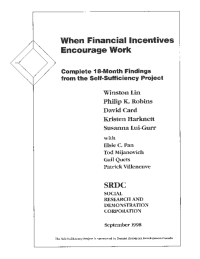When Financial Incentives Encourage Work
Complete 18-Month Findings from the Self-Sufficiency Project
Welfare reform is high on the domestic policy agenda, as provinces aim to reshape the Canadian social safety net while also controlling government expenditures. A central challenge is to achieve two often conflicting goals: making poor families less poor, while simultaneously helping them reduce their reliance on government transfer payments and achieve economic self-sufficiency. For some policymakers, fighting poverty is the main goal; for others, encouraging personal independence is paramount.
Historically, antipoverty programs that were not tied to employment sometimes reduced people’s work effort and increased their reliance on public assistance, whereas programs that increased employment and reduced welfare receipt often did not increase poor families’ overall income. Compounding the difficulties has been the dearth of hard evidence to guide some of these policy choices.
Funded by Human Resources Development Canada and managed by the non-profit Social Research and Demonstration Corporation, the Self-Sufficiency Project (SSP) was launched to help fill this knowledge gap by testing an innovative approach to meeting both goals. Through SSP, single parents in British Columbia and New Brunswick who were long-term recipients of Income Assistance (welfare) were offered a substantial financial incentive — in the form of a temporary earnings supplement — if they left Income Assistance for full-time employment. They could receive the supplement each month, for up to three years, but only if they were off welfare and working full time. In this way, SSP was designed to avoid the classic trade-off between poverty and dependence.
This report presents early but encouraging results from a rigorous evaluation of the SSP program, building on a previous report that was based on data for only part of the 6,000-person main research sample. The report shows that, 18 months into the project, people who were eligible for SSP worked more, had higher earnings and incomes, and received less welfare than a control group of similar people who were not given access to the supplements.
Furthermore, the positive results applied to a broad cross section of those in the program. In addition, for each $1 increase in government payments (because of the earnings supplements), there was a $2 increase in earnings and a more than $3 increase in income for the SSP families. Thus, SSP is encouraging more participation in the labour market and having a significant anti-poverty effect, allowing participants to set aside some money for the future as well as to spend more on necessities.






